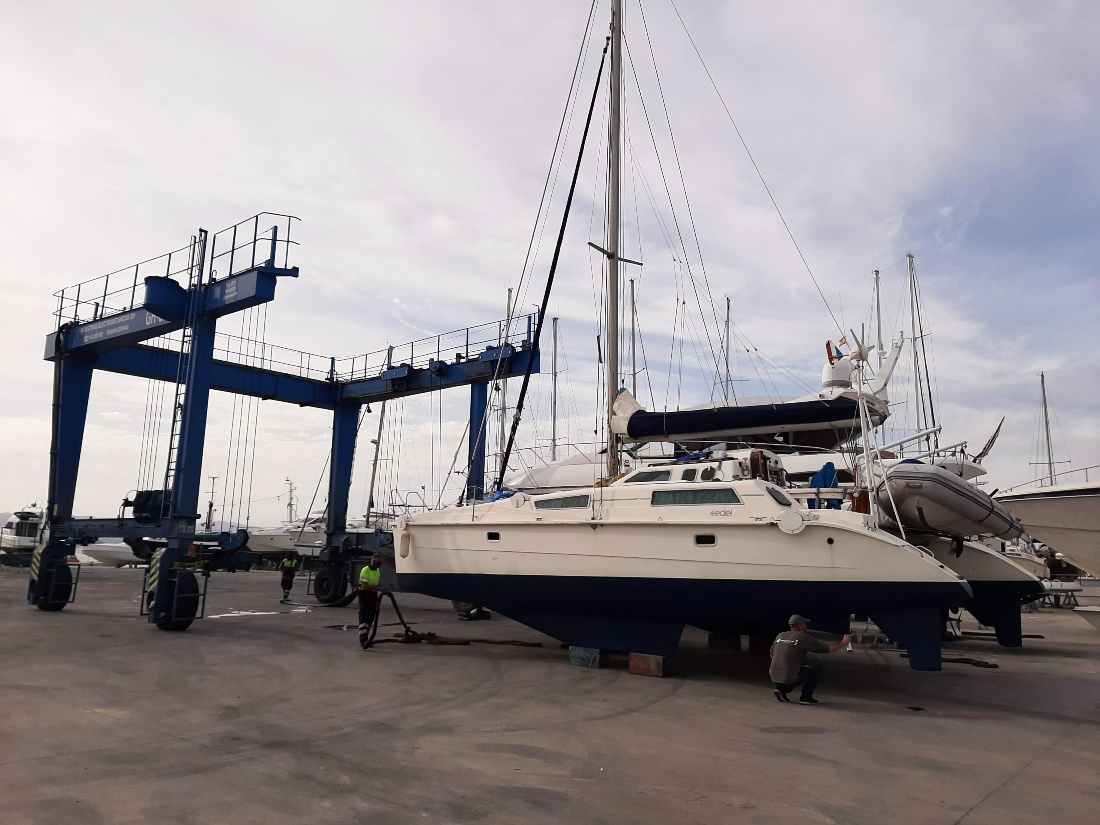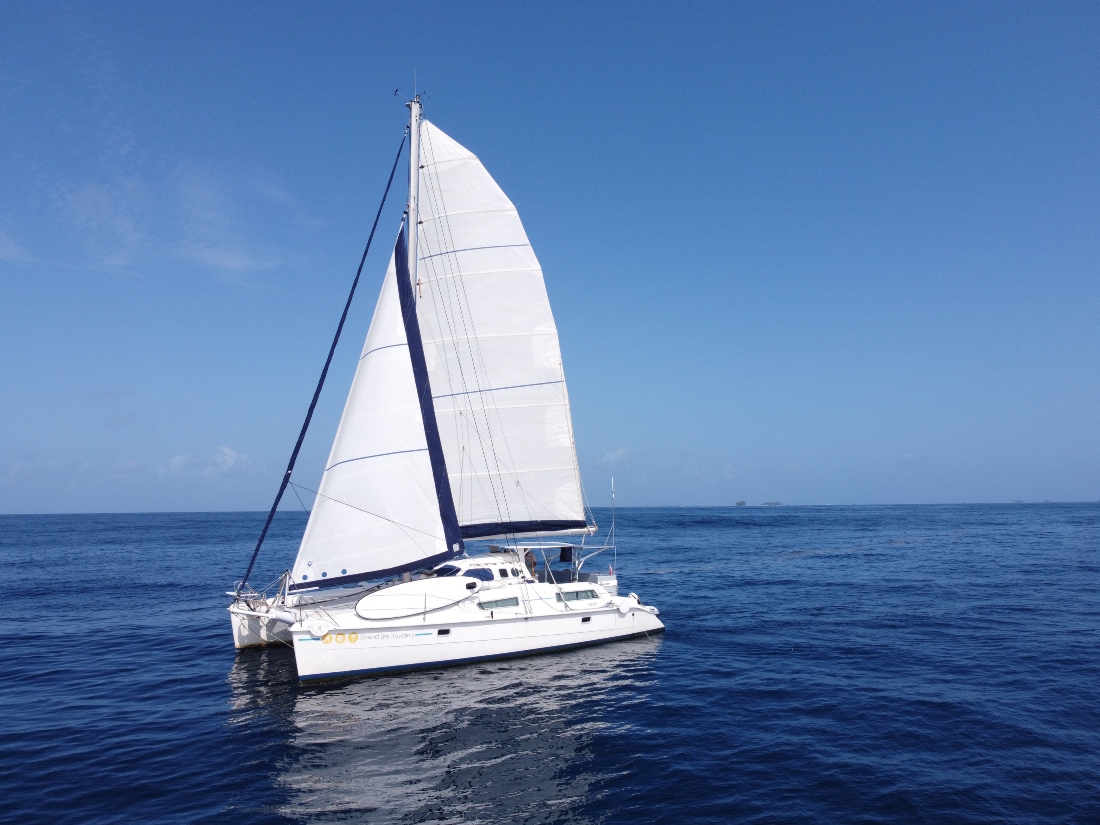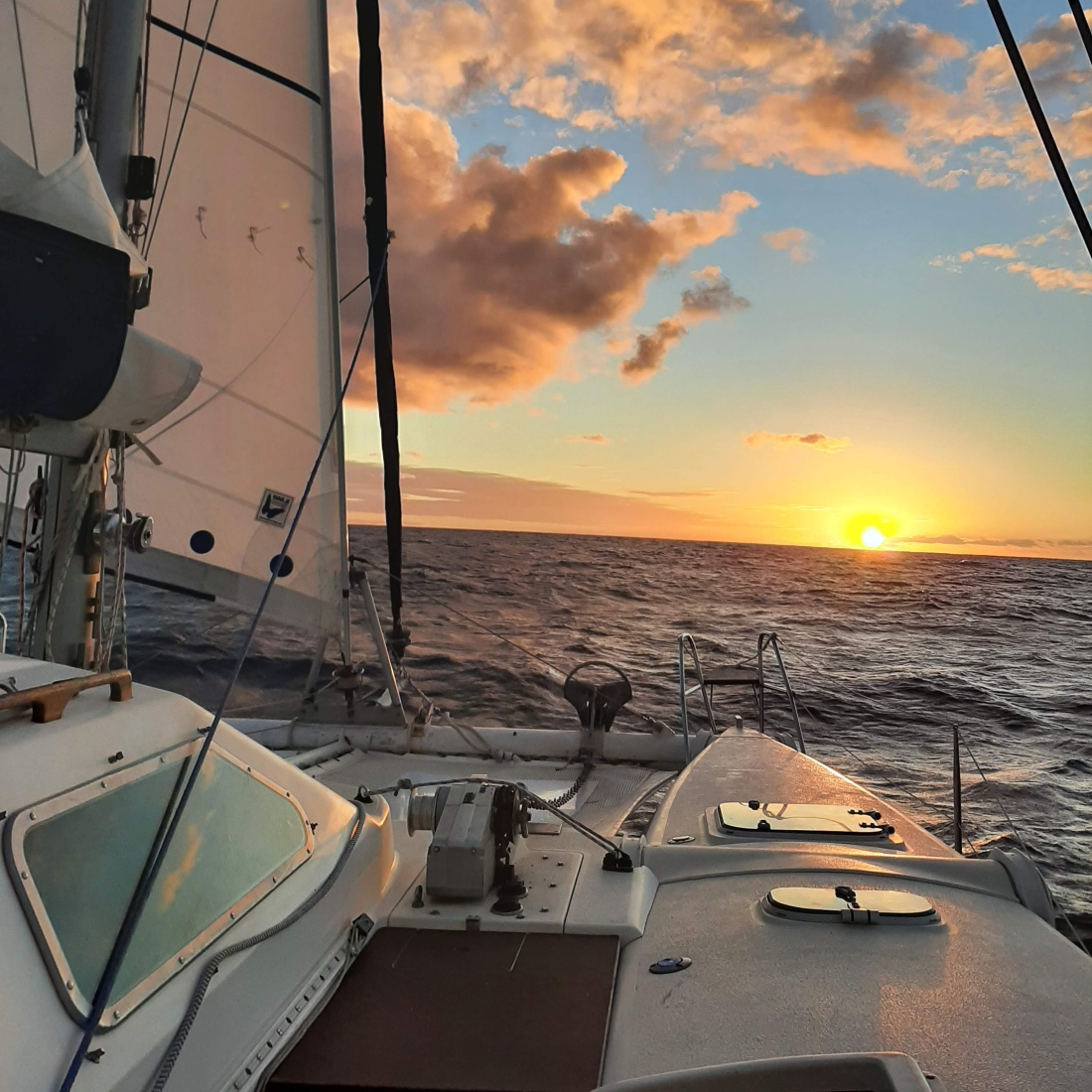


There is something undeniably romantic about life on the ocean waves.
The idea of relinquishing all your worldly goods and sailing off into the sunset has a certain appeal. But how realistic is it? Without a big pot of cash to cover your costs, can a nomadic life of remote work and odd jobs fund the cost of a life crisscrossing the world’s oceans?
Meet Sanne Wesselman, a 38-year-old Dutch native who did exactly that, as her blog Spend Life Travelling recalls.
“I’d actually been saving money to do the ‘sensible thing,’” Sanne told me.
“I was going to buy an apartment in Valencia, the Spanish city I’d been spending much of the previous three years in. But when I started looking at apartments, something just didn’t feel right. I don’t know if it was my budget, the city, or the timing, but I just couldn’t find an apartment I could actually see myself living in.”

So Sanne changed tack.
Rather than sink her savings into a small one- or two-bedroom apartment, she chose to buy a 23-year-old, 4-cabin catamaran with the idea of sailing from Southern Spain to the Caribbean.
With hardly any experience sailing or even owning a boat, Sanne splashed her cash in October 2020, and then, with the help of her friend Matt, an experienced sailor and boat builder from the UK, she spent the next two months repairing and updating the sailboat to get it ship-shape for a trans-Atlantic crossing.
In January 2021, Sanne, Matt, and a friend set sail from the Canary Islands to St. Lucia. The story of their 21-day odyssey is told on her blog. Sanne was bitten by the sailing bug, and has now spent the largest part of the last two years living, working, and sailing aboard her boat, No-Mad. So, what would Sanne recommend to anyone who fancies following in her wake and starting life aboard a sailboat?
“Well, hindsight is 20/20, but there are definitely a few things I wish I knew before I jumped into this adventure quite so naively! If you can, first rent a boat that is similar to the type you want to buy. Spend several days on the boat, ideally sailing overnight as well, to give yourself an idea of what it will be really like to live on a boat,” said Sanne.
“And know that no matter which boat you buy, things will break,” warned Sanne. “Boat parts are expensive, and YouTube is your friend to help figure out how to fix things yourself. But don’t try to save money on boat parts; go for quality or you’ll be back fixing the same problem again only weeks or months later. And yes, I learned that the hard way.”
Sanne also explained that while living on a boat in remote places may sound like a lonely affair, the boating community is incredibly friendly.
“Don’t ever hesitate to ask a neighboring boat for help and, in return, lend a hand when you see someone else who could use it,” she suggested. The change from living on land to the water, is also more than just finding your sea legs.
Another advice is to slow down.
“Take your time to know your boat and to get used to this completely different lifestyle,” said Sanne. “Enjoy the learning curve, take in the incredible sunsets once you’re anchored somewhere beautiful, but accept there will also be sleepless nights when the weather turns bad, but that’s all part of the experience.”
Sanne and Matt have now traveled extensively in her sailboat and have plenty of advice about great places to visit.
She strongly recommends you start close to home, wherever that may be. After she bought her boat, she made the mistake of almost immediately sailing it halfway across the world to a small island where she knew nobody, and where she couldn’t find parts for the things that had broken along the way. Even though she and her little crew managed that first voyage, it made for a tough entry into boat life.

So, once you’ve gotten your feet wet, metaphorically at least, where are some places to enjoy yachting and boating?
“Once you feel comfortable about your boat and you’re confident in your sailing skills, the British Virgin Islands and the Bahamas are great and relatively easy sailing destinations in the Caribbean,” advised Sanne. “The BVI’s especially have a large and very friendly sailing community. In the Mediterranean, the Greek islands are always popular because they offer relatively easy, short sails between islands.”
And Sanne’s favorites?
“I absolutely loved Panama’s San Blas islands. I’d never even heard of them before I started sailing,” she revealed. “But look them up; they are gorgeous and a unique destination to explore by boat. Navigating around the shallow reefs here isn’t the easiest, so get comfortable with your boat and sailing skills first, but then it’s a very rewarding sailing destination.”
The Bahamas also really surprised Sanne as a sailing destination. Even though she had visited before as a regular tourist, she never knew there was a whole different side to the Bahamas you really only get to see if you have access to a private boat.
“There are so many beautiful, secluded anchorages to choose from with some of the most breathtaking turquoise water you’ve ever seen,” Sanne recalled.
And what if you are thinking about traveling further afield?
If you decide to cross the Atlantic, Sanne’s advice is to take the opportunity to visit the Azores on the way. It’s another destination she’d never even considered visiting before getting a boat, but she says the islands are spectacular and the sailing community there is great.

Of course, life at sea isn’t all smooth sailing. What about the weather?
“Yeah, I’ve definitely formed a love/hate relationship with the weather,” laughed Sanne.
If there’s no wind, you can’t sail. If there’s too much wind, you can’t safely sail. If the wind shifts, you might have to change anchorage or risk dragging your anchor and end up on the rocks. She told me about the time she saw a crowded anchorage in Mexico turn into a scene of complete chaos when the wind picked up and a dozen or so boats started dragging their anchors.
“Be ready if you are out on open water. My friend Matt could tell you numerous stories about sailing in quickly deteriorating weather, including his adventures with a recent tropical storm,” she said.
Embracing life aboard a boat offers a distinct lifestyle, where adapting to varying weather conditions becomes paramount. Thoughtful preparation can mitigate many challenges. In the Caribbean, one can usually rely on the consistency of the winds, except during hurricane season, which spans from June to late November. It’s wise during these months to steer clear of the notorious hurricane belt.
Many sailors favor Curacao and Bonaire, both part of the Leeward Islands off South America’s coast, as they lie outside this hazardous zone. Conversely, in the Mediterranean, weather patterns shift rapidly. This demands regular monitoring of weather forecasts, wind intensities, potential storms, and squalls, necessitating agile adjustments to sailing plans.
And what about costs? How does living aboard as a digital nomad really work out? Is it just a romantic dream or is it achievable?
“What it costs to live full-time on a boat is one of the most frequently asked questions,” said Sanne. “Unfortunately, there’s no short answer. It really depends on the level of comfort you want, where you choose to sail, and what type of lifestyle you want.”
Sanne said she met a couple who crossed the Atlantic on a shoestring.
“Their 30-foot sailboat couldn’t have cost more than $25,000 to buy, and they are now trying to spend no more than $1,000 per month to live on the boat,” she said. “They have no indoor shower – they just jump into the ocean! They don’t have a watermaker, so they drag huge jerry cans to shore to find and stock up on fresh water whenever they make land. They never eat out, and they never use marinas because of the docking fees. That kind of frugal lifestyle can get old pretty quick.”
But then on the other hand, she’s also met people on yachts that cost well over a million who don’t blink at spending several hundred a night just on marina fees. “It’s important to be realistic about what comforts you need and base your budget on that.”
Sanne recommends asking yourself a few soul-searching questions before you make the commitment. Will you be happy to live anchored in secluded bays and cook all your meals on the boat? Or would you prefer regular stays in marinas to have easy access to facilities and restaurants?
She also says it is vital you are realistic about the expenses involved in safely maintaining your boat.
“Almost every new sailor, myself included, underestimates what boat maintenance costs,” she advised. “Whatever you think your first year of maintenance is going to cost, double or maybe even triple that.”
Sanne runs her websites, writes her blogs, and manages her digital marketing business from her boat.
“My life as a digital nomad with a boat – even though we mainly lived ‘on anchor’ in the Caribbean, and Matt can do pretty much all the maintenance himself – is definitely more expensive than my previous digital nomad life without a boat,” she told me.
It could be cheaper, but since they sail a lot, it means more maintenance and increased running costs, and they do enjoy a certain level of comforts, so they’ve also done several upgrades to make the boat feel more like a home.

It isn’t just the financial costs you need to consider.
“Another thing many new sailors don’t take into account is the time maintenance takes, as well as all the other important boat tasks, such as checking the weather, moving anchorage, finding fuel, buying or making water… the list is incredibly long, and it all takes away from the time you can spend working,” Sanne said. “If your remote job also requires you to work a 40-hour week, your days will be very long.”
Technology is helping. Thanks to Starlink, WiFi is becoming a lot more reliable and affordable, which makes boat life possible for more and more digital nomads.
Finally, I wonder, is there any chance we will see Sanne selling up any time soon and buying that apartment?
“Oh, you might!” she laughed. “A lot of boat owners contemplate selling their boats from time to time. Work on a boat never ends. The uncertainty of the weather means sleepless nights when at anchor, and constantly adjusting plans when you were just about to sail somewhere can be frustrating.”
She said sometimes, the idea of just flying from one destination to the next and staying in comfy hotels or Airbnbs appeals as an easier way to travel. “But selling the boat would also mean missing out on some unique destinations and saying goodbye to a wonderful, adventurous lifestyle.”
So, what is next for Sanne?
“For now, we plan to sail around Spain and possibly to Morocco. But since sailing in the Mediterranean in winter isn’t that enjoyable, we are also going to use that as the perfect excuse to take a break and travel without the boat, probably to Asia, in winter. And that, for now at least,” said Sanne, “feels like the best of both worlds to me!”





